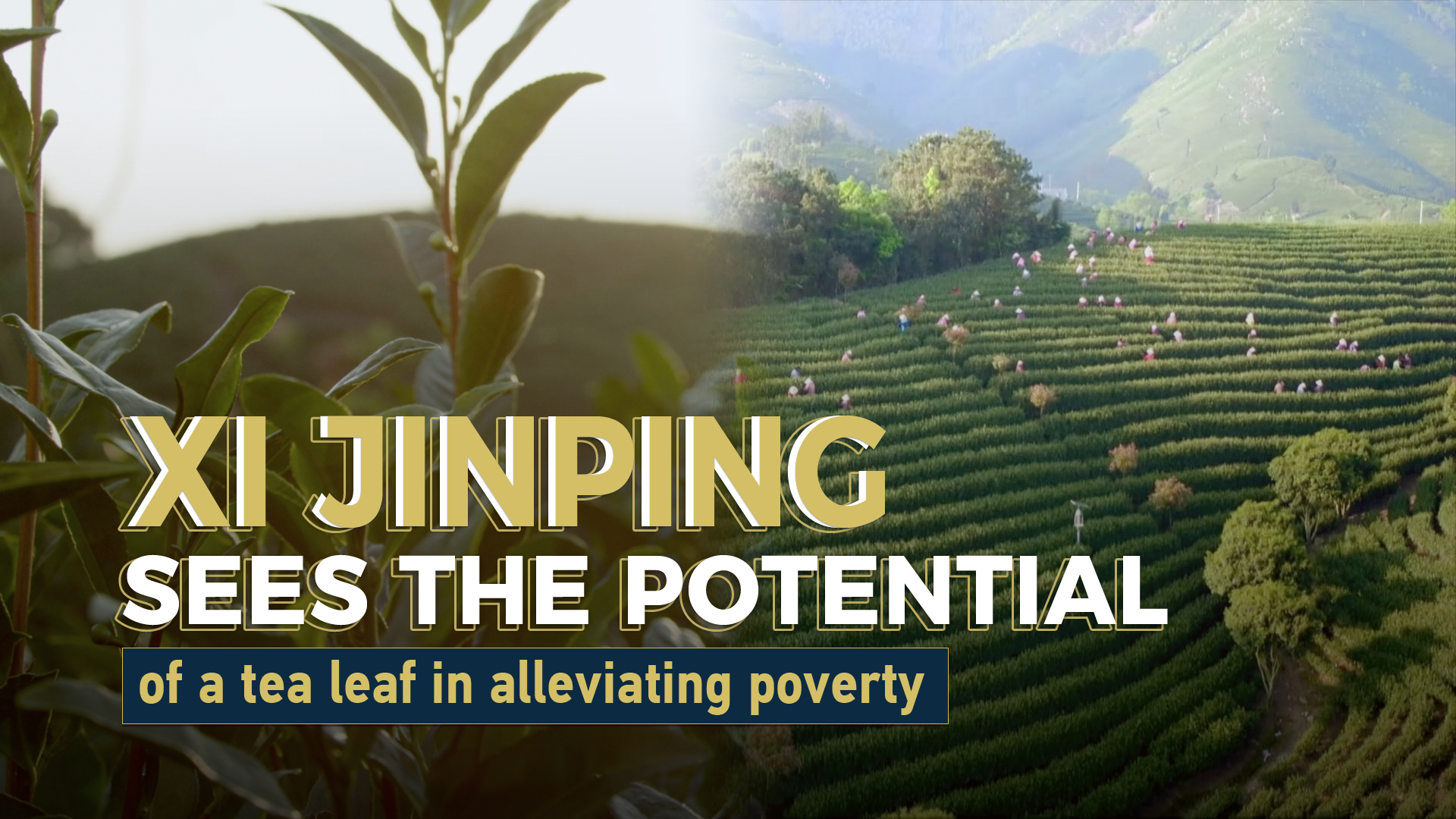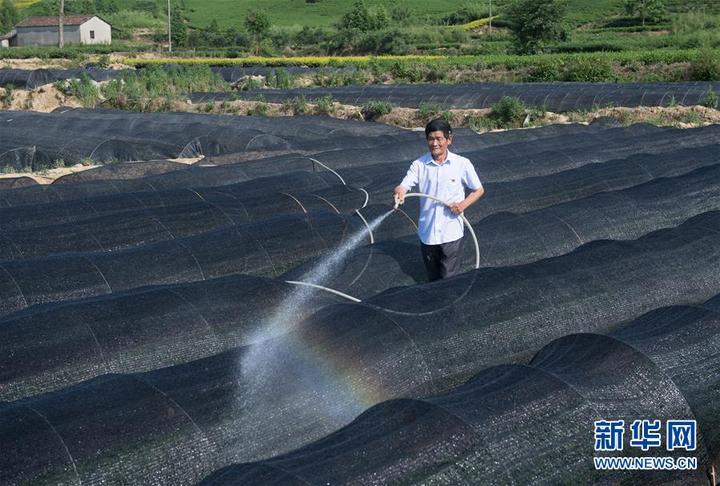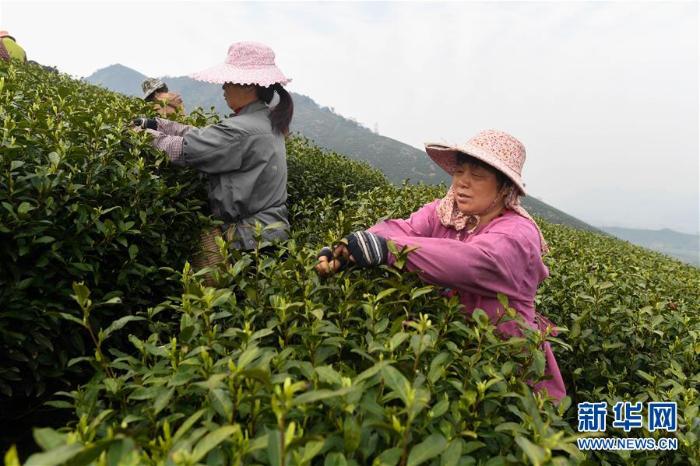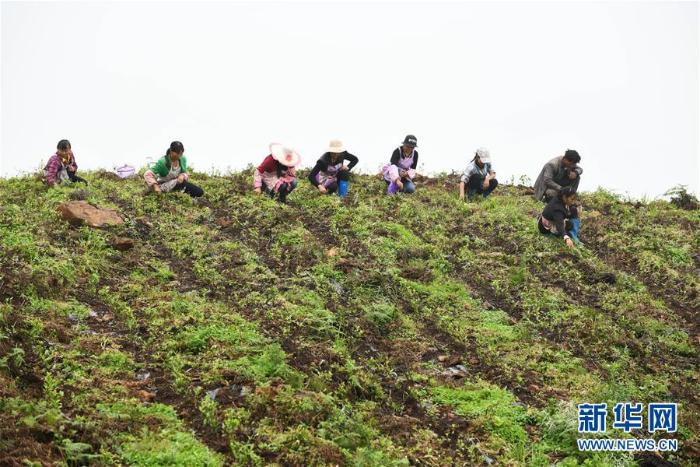10:14

A leaf has turned a poverty-stricken village in east China's Zhejiang Province into a tea garden. The village's turning point was the 2003 visit of Xi Jinping, then a provincial official who placed poverty alleviation at the heart of his political work.
A leaf brings hope to a poor village
In 1989, the only road in Huangdu Village was a winding and muddy dirt path. Houses and buildings were also dilapidated. It was one of the poorest villages in Anji County of Zhejiang Province.
Around 1997, the then secretary of the Communist Party of China (CPC) branch in the village proposed to cultivate white tea leaves and create a local tea production base as a source of income.
But the idea was rejected by the villagers. "They were unwilling to plant tea leaves, and were concerned with the sales," recalled Sheng Alin, the then Party secretary of the village. To set an example, local officials took the lead in planting white tea leaves and offered 4,500 yuan ($543) in subsidies for every hectare of land. Gradually, villagers were motivated and production increased.

This undated photo shows Sheng Alin spraying water at a white tea seedling base at Huangdu Village, Anji County of east China's Zhejiang Province. /Xinhua
This undated photo shows Sheng Alin spraying water at a white tea seedling base at Huangdu Village, Anji County of east China's Zhejiang Province. /Xinhua
Xi's visit, a turning point
The real turning point came on April 9, 2003, when the then Secretary of the CPC Zhejiang Provincial Committee Xi Jinping inspected Huangdu Village.
He walked around the tea production base along the muddy roads and inquired about tea cultivation. When hearing that the village was making more than 180,000 yuan in profits annually, he was happy and said, "A leaf created an industry and made the local people rich."
"Huangdu Village became rich by growing tea thanks to the words by Xi Jinping," said Sheng Awei, the current local Party secretary. "He was far-sighted and saw we were on the right path. We turned a barren mountain into a tea garden!"
After Xi's visit, the village expanded its tea base. By 2010, the growing area topped 667 hectares and ranked first in the county. In 2019, tea output was valued at more than 400 million yuan in the village, and the annual per capita income exceeded 49,000 yuan. "It's a far cry from what it was 20 years ago!" cheered Sheng Awei.

Farmers pick tea leaves at Huangdu Village, Anji County of east China's Zhejiang Province, March 24, 2018. /Xinhua
Farmers pick tea leaves at Huangdu Village, Anji County of east China's Zhejiang Province, March 24, 2018. /Xinhua
Xi stresses role of tea production in rural growth
Xi has worked in counties, cities, provinces, and the central government of China for over 40 years. He stayed in Zhejiang for five years from 2002 to 2007. At the time, Zhejiang had 26 underdeveloped counties and 361 underdeveloped townships. After Xi became secretary of the provincial Party committee, he visited 11 cities and more than 20 counties in a short period of time, many of which were economically struggling mountainous counties.
Gu Yikang, who at the time was vice director of Zhejiang Provincial Rural Affairs Office, accompanied Xi on his visits to underdeveloped mountainous regions in 2003 and 2004. "He (Xi) always stressed that we wouldn't achieve all-round well-being in Zhejiang before the underdeveloped regions achieved moderate prosperity," Gu said, adding that Xi paid much attention to the development of the tea industry in these regions.
"Tea production in Zhejiang has risen for 20 consecutive years, which has not only increased the income of millions of farmers, but also provided a new idea about the transition of the rural economic growth pattern. It also provided the basis and conditions for the construction of a new socialist countryside," wrote Xi in a 2006 article.
Lucid waters and lush mountains for sustainable growth
Forests cover 60 percent of Zhejiang's area and the province also boasts great ecological advantages.
In August 2005, Xi inspected Anji County again and proposed the concept of "two mountains" for the first time. "Lucid waters and lush mountains are invaluable assets". We used to say that we want not only lucid waters and lush mountains, but also mountains of gold and silver. In fact, lucid waters and lush mountains can be as precious as mountains of gold and silver," he said.
Under Xi's leadership, Zhejiang carried out several development projects for underdeveloped areas. By 2007, the annual per capita income of farmers in 361 townships exceeded the national rural average. By 2015, the remaining 26 impoverished counties in Zhejiang had been removed from the poverty list. Zhejiang became the first province in China to get rid of extreme poverty.
"Growing tea literally meant turning 'lucid waters and lush mountains into mountains of gold and silver!'" said Sheng Awei.

Famers work at a tea garden in Tunshang village, Pu'an County of southwest China's Guizhou Province, July 7, 2019. Some local tea gardens plant tea seedlings donated by Huangdu Village of east China’s Zhejiang Province. /Xinhua
Famers work at a tea garden in Tunshang village, Pu'an County of southwest China's Guizhou Province, July 7, 2019. Some local tea gardens plant tea seedlings donated by Huangdu Village of east China’s Zhejiang Province. /Xinhua
Tea famers share success formula
The year 2018 marked the 15th anniversary of Xi's visit to Huangdu Village. Since his trip, life has become easier and more dignified for villagers thanks to their tea business and Xi's foresight. Sheng Awei and 19 other Party members wrote a letter to Xi, telling him the villagers would like to donate 15 million tea seedlings to poverty-stricken areas to help them shake off poverty.
In his reply to the letter, Xi praised the idea of "when drinking the water of a well, one should never forget those who dug it; after becoming rich, they have never forgotten the kindness and love of the Party." He wrote that it is of great significance that those who have already become better off help those who are still living in poverty.
Led by the Development Guidance Department of the State Council Leading Group Office of Poverty Alleviation and Development, Huangdu Village eventually helped 5,839 registered impoverished farmers in four counties across three provinces in China's southwestern regions to grow tea seedlings.

